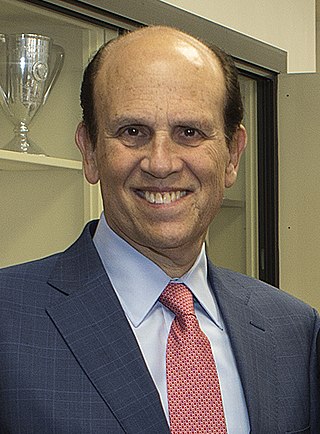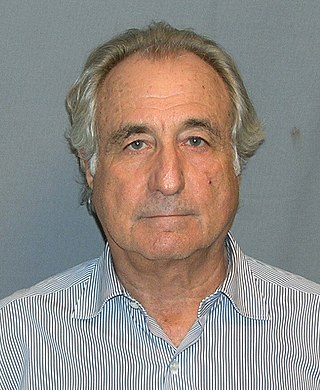Related Research Articles

Michael Robert Milken is an American financier. He is known for his role in the development of the market for high-yield bonds, and his conviction and sentence following a guilty plea on felony charges for violating U.S. securities laws. Milken's compensation while head of the high-yield bond department at Drexel Burnham Lambert in the late 1980s exceeded $1 billion over a four-year period, a record for U.S. income at that time. With a net worth of US$6 billion as of 2022, he is among the richest people in the world.
EF Hutton was an American stock brokerage firm founded in 1904 by Edward Francis Hutton and his brother, Franklyn Laws Hutton. Later, it was led by well known Wall Street trader Gerald M. Loeb. Under their leadership, EF Hutton became one of the most respected financial firms in the United States and for several decades was the second largest brokerage firm in the country.
The 2003 mutual fund scandal was the result of the discovery of illegal late trading and market timing practices on the part of certain hedge fund and mutual fund companies.
Martin R. "Marty" Frankel is an American financial criminal who conducted a series of investment frauds in the late 20th century, causing hundreds of millions of dollars in losses. He was caught in 1999, and in 2004 was sentenced to 200 months in prison based on over $200 million in proven losses to insurance companies he bought then looted their actuarial reserves; the sentence was reaffirmed in 2006.
Penny stocks are common shares of small public companies that trade for less than one dollar per share. The U.S. Securities and Exchange Commission (SEC) uses the term "Penny stock" to refer to a security, a financial instrument which represents a given financial value, issued by small public companies that trade at less than $5 per share. Penny stocks are priced over-the-counter, rather than on the trading floor. The term "penny stock" refers to shares that, prior to the SEC's reclassification, traded for "pennies on the dollar". In 1934, when the United States government passed the Securities Exchange Act to regulate any and all transactions of securities between parties which are "not the original issuer", the SEC at the time disclosed that equity securities which trade for less than $5 per share could not be listed on any national stock exchange or index.
Coingate is a nickname for the Tom Noe investment scandal in Ohio revealed in early 2005 in part by Toledo, Ohio newspaper The Blade. The Ohio Bureau of Workers' Compensation (BWC) invested hundreds of millions of dollars in high risk or unconventional investment vehicles run by people closely connected to the Ohio Republican Party who had made large campaign contributions to many senior Republican party officials.
Thomas W. Noe is a former Ohio Republican party fundraiser and activist, guilty of money laundering for the 2004 Bush-Cheney campaign and of theft and corruption in the "Coingate scandal". A longtime resident of Toledo, Ohio, Noe and his wife, Bernadette, held several party positions and minor offices within the government of Ohio. He was also a prominent Republican fundraiser and served as chairman of the 2004 Bush-Cheney election campaign in Northwest Ohio and chairman of the Lucas County Republican party. Noe was also an avid coin dealer and owned various coin dealing companies, such as Capital Coin and Vintage Coins & Collectibles, as well as their subsidiaries.
Robert Emmet Brennan is an American businessman and former accountant who built the infamous penny stock brokerage firm, First Jersey Securities. The firm specialized in promoting "Pump and dump" penny stocks to unsuspecting investors, many of them elderly, who lost their entire investments when the stocks inevitably crashed.

The Madoff investment scandal was a major case of stock and securities fraud discovered in late 2008. In December of that year, Bernie Madoff, the former Nasdaq chairman and founder of the Wall Street firm Bernard L. Madoff Investment Securities LLC, admitted that the wealth management arm of his business was an elaborate multi-billion-dollar Ponzi scheme.
Daniel Mark Porush is an American businessman, former stock broker and convicted criminal who helped run a "pump and dump" stock fraud scheme in the 1990s at the Stratton Oakmont brokerage in collaboration with Jordan Belfort. In 1999, he was convicted of securities fraud and money laundering, for which he served 39 months in prison. After prison, Porush became involved with a Florida-based medical supply company, Med-Care, which was the subject of federal investigations. In the biographical 2013 film The Wolf of Wall Street, which focuses on the story of Belfort and Stratton Oakmont, Jonah Hill portrays Donnie Azoff, a character loosely based on Porush. Porush has called the portrayal inaccurate and threatened to sue the filmmakers to prevent him from being depicted.

Benjamin Wey is a Chinese-born US Wall Street financier and CEO of New York Global Group (NYGG). He began his financial career as an investment advisor and broker in Oklahoma in the late 1990s. Wey and NYGG were among the most active "facilitators and promoters" of reverse takeovers, which created Special-Purpose Acquisition Companies (SPAC) and allowed small Chinese companies to raise capital on U.S. markets, until reverse takeovers became the subject of a U.S. Securities and Exchange Commission investigation in 2011.
Stephen D. Richards is a New Zealand-born technology industry business leader who rose through the ranks of Computer Associates International, to become the Executive Vice President responsible for Worldwide Sales. His role in the company's 35 day month accounting scandal led to his resignation; he was the second CA executive to be indicted and sentenced
Mark (Meir) Nordlicht is the founder and former chief investment officer of Platinum Partners, a U.S. based hedge fund, which came to be known for its unusual investment strategies becoming the subject of a series of controversial criminal and legal actions. According to an indictment, Nordlicht, in addition to the fund's co-CIO and CFO, were accused of running a "ponzi like scheme". A jury acquitted all defendants on the core charges relating to the Ponzi scheme operation, but found two of the lead executives guilty on the lesser charges relating to a bond-rigging scheme. In an unusual move, Judge Brian Cogan, presiding in the case of United States vs. Nordlicht, et al., reversed the jurors' guilty verdicts and acquitted the firm's co-CIO of the lesser charges in a full acquittal, but ordered a new trial to be set for Nordlicht. An appellate court later upheld the convictions.
International Gold Bullion Exchange was a gold bullion dealer that committed major fraud during the early 1980s.
Bell & Beckwith was a regional stock brokerage firm in Toledo, Ohio, that failed in 1983 as a result of massive fraud. It was the costliest failure for the Securities Investor Protection Corporation (SIPC) at that time.
Lowell McAfee Birrell was one of the biggest stock manipulators in the 1950s. He fled the United States to Brazil, but eventually returned and served time in prison for securities fraud.
ESM Government Securities, Inc. was a Fort Lauderdale, Florida-based government securities dealer, specializing in repurchase agreements and reverse repurchase agreements. The failure of the company in March 1985 precipitated the collapse of Home State Savings Bank, deposit runs on dozens of other banks in Ohio, and the downfall of the private Ohio Deposit Guarantee Fund.
Clifford Dixon Noe (1930–2004) was an international conman and swindler. He specialized in using bogus companies, forged securities, and fictitious offshore accounts to swindle investors. He was included by Fortune magazine on its 1988 list of the 25 most fascinating business people. The magazine said that the FBI ranked Noe as "among the most notorious white-collar criminals ever." He was described by a sentencing judge in England as "an international swindler on the highest level."

Trevor Robert Milton is an American convicted felon, former businessman and the founder and former executive chairman and CEO of Nikola Corporation. In September 2020, Milton resigned from his position as executive chairman after the U.S. Securities and Exchange Commission and Department of Justice began investigating claims that Milton and Nikola committed securities fraud. In July 2021, Milton was indicted by federal prosecutors on three counts of securities fraud and wire fraud and released on $100 million bail. In June 2022, he was charged with another count of wire fraud. In October 2022, he was found guilty on three of the four counts.
References
- 1 2 Ettorre, Barbara (May 1994). ""Nobody put me in prison but myself"". Management Review. 83 (5): 14.
- 1 2 Kleinfield, N. R. (September 7, 1983). "BECKWITH PARTNER GETS 25-YEAR JAIL TERM". The New York Times. ISSN 0362-4331 . Retrieved December 21, 2022.
- 1 2 Kleinfield, N. r (March 10, 1983). "RIPPLES OF A FAILED BROKERAGE". The New York Times. ISSN 0362-4331 . Retrieved January 4, 2023.
- 1 2 "Quarter-century after Toledo fraud, perpetrator says little was learned". The Blade. Retrieved December 21, 2022.
- 1 2 "Former Bell & Beckwith managing partner Edward Wolfram Jr..." UPI. Retrieved December 21, 2022.
- ↑ Departments of Commerce, Justice, and State, the Judiciary, and Related Agencies Appropriations for 1986. Washington, D.C.: U.S. Government Printing Office. 1985. p. 893.
- 1 2 "United States of America v. Edward P. Wolfram, Jr". SEC Docket. 27 (2): 768–769. February 8, 1983.
- ↑ Callahan, David (2007). The Cheating Culture: Why More Americans Are Doing Wrong to Get Ahead. Houghton Mifflin Harcourt. ISBN 978-0-15-603557-6.